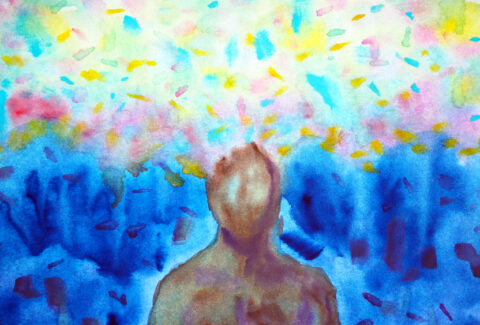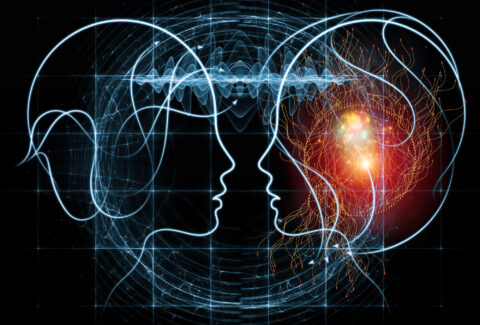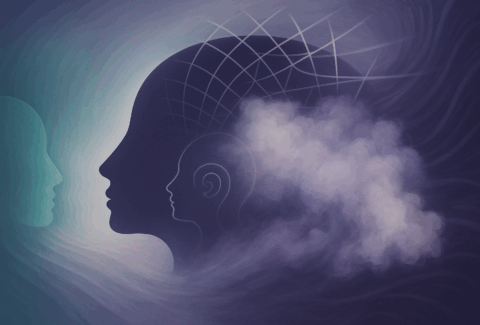Jungian Psychology & Edward Edinger
Introduction
Edward F. Edinger (1911–1998)[1] was a significant figure in the development of Jungian psychology in America, known for his deep exploration of the human psyche and its complexities.[2] His work bridged the gap between psychology and spirituality, offering insights that resonate with individuals on their journeys of self-discovery and personal transformation. Through his writings, teachings, and clinical practice, Edinger emphasized the importance of understanding the Self and the individuation process, thereby providing valuable tools for personal growth and psychological healing.
Early Life and Education
Born in 1911 in Pennsylvania, Edinger was drawn to the humanities from a young age. He pursued a medical degree at the University of Pennsylvania, where he graduated in 1935. Early in his career, Edinger practiced Freudian psychoanalysis but soon transitioned to Jungian analysis after encountering Carl Jung’s works. This shift marked a transformative period in his professional life, leading him to train at the C.G. Jung Institute in Zurich, where he studied under notable Jungian analysts.
The Concept of the Self
One of Edinger’s most significant contributions to Jungian psychology is his exploration of the concept of the Self. In his groundbreaking book Ego and Archetype, he articulated the relationship between the conscious ego and the Self[3], which he regarded as the archetype of wholeness. Edinger argued that while the ego represents an individual’s conscious identity, the Self encompasses the entirety of the psyche, including both conscious and unconscious elements.
He emphasized that the process of individuation—integrating the ego with the Self—requires individuals to engage with their unconscious material actively. Edinger highlighted the significance of dreams, symbols, and personal narratives in this journey, suggesting that these elements serve as bridges to self-discovery and healing.
Mythology, Symbols, and the Collective Unconscious
A hallmark of Edinger’s work is his in-depth engagement with mythology and symbolism.[4] He believed that myths and archetypal images provide essential insights into psychological dynamics and personal growth. In his writings, he often examined biblical and mythological narratives, elucidating their psychological significance and their relevance to the individual’s inner journey.
In The Bible and the Psyche, Edinger explored the psychological implications of biblical stories, arguing that they reflect universal themes of struggle, transformation, and redemption. His analysis illustrated how these narratives can guide individuals in understanding their psychological experiences and the broader human condition.[5]
Integrating Psychology and Spirituality
Edinger’s work stands out for its emphasis on the intersection of psychology and spirituality. He believed that psychological growth is intrinsically linked to spiritual development, suggesting that the individuation process leads individuals toward a deeper connection with themselves and the universe. Edinger encouraged a holistic approach to mental health, advocating for the integration of spiritual practices into psychological work.[6]
His insights offer a pathway for individuals to explore their spiritual beliefs as integral to their psychological well-being. By recognizing the spiritual dimension of the psyche, individuals can engage in a more profound and meaningful process of self-exploration and healing.
Legacy and Continued Influence
Edward Edinger’s contributions to Jungian psychology have had a lasting impact on the field. His emphasis on the importance of the Self, the role of mythology, and the integration of spirituality into psychology have enriched the understanding of human experience. His writings and teachings continue to inspire psychologists, therapists, and individuals seeking personal growth and self-awareness.
Edinger’s ability to articulate complex psychological concepts in accessible terms has made his work a vital resource for those interested in Jungian psychology. His legacy serves as a bridge between traditional Jungian thought and contemporary psychological discourse, providing insights that remain relevant today.[7]
Conclusion
Edward Edinger was a pioneering figure in Jungian psychology, whose work emphasized the depth and complexity of the human psyche. His exploration of the Self, the significance of myth and symbol, and the connection between psychology and spirituality have illuminated the path of individuation and personal transformation. As we continue to navigate our inner landscapes, Edinger’s teachings remind us of the importance of understanding ourselves fully, embracing the journey toward wholeness, and recognizing the spiritual dimensions of our psychological experiences. His legacy encourages us to seek the depths of our own psyches and embark on a transformative journey toward self-discovery and healing.
[1] Robertson, Robin. “A guide to the writings of Edward F. Edinger.” Psychological Perspectives 39.1 (1999): 47-59.
[2] Edinger, Edward F. Encounter with the self: a Jungian. Toronto, ON, Inner City Books, 1986.
[3] Edinger, Edward F. “THE EGO-SELF PARADOX.” Journal of Analytical Psychology 5.1 (1960).
[4] Edinger, Edward F. The eternal drama: The inner meaning of Greek mythology. Shambhala Publications, 2001.
[5] Edinger, Edward F. “The Creation of Consciousness: Jung’s.” (1984).
[6] Edinger, Edward. Living Psyche: A Jungian Analysis in Pictures Psychotherapy. Chiron Publications, 1989.
[7] Robertson, Robin. “A guide to the writings of Edward F. Edinger.” Psychological Perspectives 39.1 (1999): 47-59.







